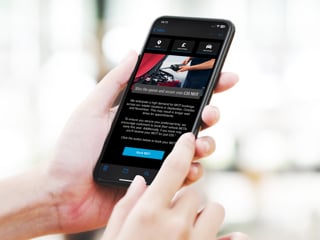Bumper chief commercial officer Jack Allman speaks to AM editor Tim Rose about the aftersales finance provider's plans for 2021.
I suppose the purpose of Bumper is to help consumers cope with those sudden big repair bills, is that right?
We want to help dealerships maximise their revenue opportunities at the same time as helping the customer. Ultimately, we see it as a win/win outcome; the dealer maximises its parts and labour opportunity and the customer gets their car back on the road by being able to authorise more of that work because they can spread the cost of it – interest-free, and therefore it’s not a big financial hit to them. Most people don’t expect to budget for when things go wrong with their car. We’re on a bit of a crusade to remove discounting from the industry. Very few industries allow you to negotiate on your laptop, sofa etc., but you come in for your car repair and chip the dealer on it. For me that just erodes that value proposition – you have genuine parts, trained technicians, beautiful facilities yet you’re drawn in to a position where you’ve told the customer it’ll be £500 but you then say you’ll do it for £450. In reality, that doesn’t solve anything for the customer.
Do service advisors feel the need to discount because they fear the customer will go away to find somewhere cheaper?
There’s that perception that franchised dealers are more expensive than independents, but, in reality, they are super price competitive now. If a service advisor can say ‘we’ve checked over the car, most things are okay. There’s just a couple of items that need attention, it’s going to be £300 but you can pay £100 a month, would you like us to go ahead with that?’ it’s a far more positive conversation. In reality a discount won’t help. If you’re facing a £300 bill and get given 10% off, that £270 is still a problem for most people. But if you get to pay £100 a month, and you’re already thinking in monthly budgets as you might have a PCP and service plan, carrying that forward can create an exceptional experience. Whether its gym memberships or paying the TV licence, I don’t know anyone that’s not paying for things monthly. But when it comes to car repairs it’s big lump sums, and that’s what we need to address.
When the workshop already has their car, and may have given them a loan car, doesn’t it make sense to make it easy?
Many customers will value the convenience. Absolutely. Many people defer work because of the cost, they’ll have some of it done now and re-book in a few months when they can afford the rest. But if you can say to them to get it all done now and then don’t worry about coming back in six months, that convenience is valuable. Retaining that car for longer is the panacea for dealers; the car gets to four years old, warranty lapses and they start to lose them. The average age vehicle we’re funding in the franchised space is just more than six years old; with customers spending significant sums but then scoring us 4.9 out of 5 on Trustpilot. So it’s old cars, big bills, but customers coming out feeling they’ve had a five-star experience. You don’t necessarily get that with giving 10% off. The underlying principle of interest-free credit, known as ‘buy now pay later’, is it helps convert customers. It gets them into the shop or dealership and it increases their average spend. There are positive outcomes.
Given many dealers are looking to increase sales of older cars, and growth in electric vehicles may impact on their service revenues, they need opportunities to hold onto these customers for aftersales too, don’t they?
Definitely. The UK’s average age of a vehicle has just peaked at 8.4 years, and, if people are holding onto their cars for longer, in theory repairs get more significant and more costly, so dealers need to help them. It’s not to say that every customer will go for monthly payment; some will pay cash, some use credit cards and some might have accounts. But there’s a growing subset of customers who want to pay instalments by digital methods. Our average customer age is 41.
You started as Auto Service Finance and rebranded to Bumper, and marketed this to both the trade and consumers. Why consumers?
We have a service where we push customers into our partnership network. We have a concept of a pre-approved customer, so if you know you’ve an MOT coming up or work identified but don’t know how to pay for it, you can go to our website, get pre-approved and select a partner business. We have around £1m being preapproved per month through the website – these are customers searching to get their cars repaired. Auto Service Finance wasn’t particularly consumer friendly. Bumper is more memorable for drivers. It works in different markets with different languages. Bumper has the association with automotive, which is important to us because we don’t operate in any other sectors.
And now you’re pushing out into Europe?
We launched in Ireland in the middle of the pandemic last year, which, in hindsight, was dreadful, but it allowed us to learn on a small scale, which was beneficial. In Q3 we’re launching into some mainland Europe markets, helped by some of our OEM partnerships.






















Login to comment
Comments
No comments have been made yet.